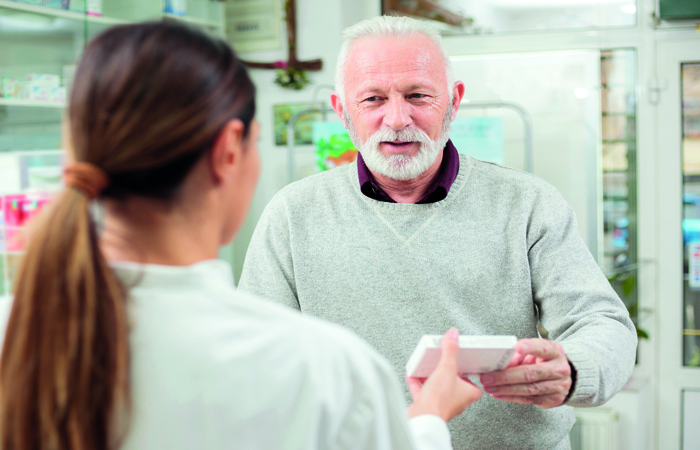OTC

Let's talk about sexual health
In OTC
Bookmark
Record learning outcomes
Sexual health services are stretched to the limit, thanks to funding cuts and record levels of STIs, an increased demand for contraceptives and greater need for HIV and STI testing.
As well as preparing for the switch of sildenafil, what can pharmacy teams do to help to meet demand for sexual health advice?

The latest figures show there were almost 420,000 new STI diagnoses made at sexual health services in England in 2016. The most common infections were chlamydia (202,546), which accounted for 49 per cent of all new diagnoses, first episode of genital warts (15 per cent), gonorrhoea (9 per cent) and non-specific infections (9 per cent). Worryingly, there has been a 12 per cent rise in syphilis diagnoses from 2015 to 2016, the highest number of cases since 1949.
Young people aged 15 to 24 have the highest diagnosis rate for STIs, with young women seven times more likely and young men twice as likely to be affected as other age groups.
“Society is changing in terms of our acceptance of casual sex and the number of sexual partners we have,†says Dr Mark Lawton, sexual health consultant and chair of the British Association for Sexual Health & HIV media group. “Dating apps have played an important role in this. Condom usage is not as widespread as we’d like it to be, so we need to do more to encourage this.â€
Attracting new footfall and showcasing the role of pharmacy in providing health advice, particularly to younger generations can also have a positive impact longer term as these customers become regular visitors, says Laura Reed, head of professional development at Numark. “If they receive a positive experience of the pharmacy they are likely to return for further advice and support when required and promote the pharmacy to their peers.â€
Dr Anthony Nardone, head of sexual health promotion at Public Health England, says: “Pharmacy teams are a key resource in promoting good sexual health to the population through a variety of services. They also have a key role in reaching disadvantaged groups for access to sexual health services.â€
Tips for pharmacy staff
The category needs the right approach, mostly because of the potential for embarrassment for people seeking advice. If community pharmacy is going to be a key place where people come for advice then access needs to be made as straightforward and stress-free as possible for them.
1. Prioritise staff training
“Sexual health can be a sensitive topic for discussion, so staff training is essential,†says Ms Reed. “It’s important to remember that pharmacy staff are often the first point of contact with customers, and the first impression they give can determine how satisfied a customer is, or even if they use the service at all. It’s therefore important that all staff who are likely to come into contact with customers receive training to ensure they provide a non-judgmental, discreet service.â€
2. Ask the right quesitons, but sensitively
“We ask the right questions sensitively, minimising the embarrassment for the service users, and for staff who might be less used to talking about sexual health matters,†says Andrew Dawson, pharmacist at Well. “Fumbling for words or getting tongue-tied if you are a professional can lead to increasing embarrassment for the service user.â€
3. Use language your customers will understand
“It’s important to be matter-of-fact when discussing sexual health with your customers, but it’s also important to avoid medical jargon as much as you can, as this will help them to feel more comfortable and they will then be more open to discussion,†says Dr Lawton.
The sexual health market
According to Mintel, sales in the category are expected to continue rising, thanks to increased STI levels and efforts to control these. Sales of condoms and female lubricants will rise to about £95 million by 2021, and possibly up to £112 million, from current sales of about £80 million, predicts the market research organisation.
“Sexual health is a small portion of our sales,†says Mr Dawson. “But it is an area of potential growth as self-testing kits for STIs become increasingly available. By buying a kit in a pharmacy, a patient will be able to access immediate expert advice.â€
The impact of Viagra
By far the biggest potential growth driver in sexual health to hit community pharmacy in years is the launch of Viagra Connect (OTC sildenafil) this spring.
“The launch of Viagra Connect will effectively expand the sexual health category by introducing erectile dysfunction as a condition that men can seek help, support and treatment for via pharmacy,†says Kristie Sourial, medical manager at Pfizer Consumer Healthcare.
“It will provide men with a new and convenient route to address their symptoms, providing the pharmacist deems the customer suitable for treatment following a consultation. The launch is a great opportunity to bring men into pharmacies who may not usually engage with a healthcare professional, and to help them improve their overall wellbeing.â€
Viagra Connect will be available to men aged 18-plus without a prescription. Supply will be subject to a pharmacist’s assessment of ED symptoms. It is hoped the launch will steer men away from buying counterfeit Viagra online and encourage them to have more open discussions with pharmacists about their health.
“Research indicates that more than 40 per cent of men with ED may not seek help from a healthcare professional,†says Ms Sourial.
 “We believe the availability of Viagra Connect as a pharmacy medicine may help facilitate earlier presentation of these men to a healthcare professional, who can then provide education and advice, not only on ED but on related general health issues.â€
A pharmacy training programme includes tailored content for pharmacy assistants. “Educational videos on how to have a conversation about ED are available to help pharmacists consider the best way to discuss this potentially sensitive subject,†says Ms Sourial. She stresses the importance of using non-technical terms during the consultation.
“Once sildenafil becomes over the counter, there will be a huge expansion in OTC products related to sexual pleasure, as opposed to just sexual health,†says Mr Dawson. “It can be difficult for some men to tackle the issue of erectile dysfunction in traditional settings, and by the drug being available OTC, this may increase their opportunities to talk about this issue.â€
Ms Reed is also optimistic. “The launch of OTC Viagra will hopefully raise the role of pharmacy in providing sexual health advice,†she says. “It may also increase the number of men visiting the pharmacy for advice and support, allowing pharmacists to provide other opportunistic health advice.â€
Improve your sexual health category
If there was ever a time to look at this category in your pharmacy and make improvements, it’s surely now. Here is a range of ideas for what can be done:
- “Separate out your category based on what customers might be searching for,†says Ms Reed. “For example, have an area dedicated to pregnancy and ovulation tests and an area dedicated to sexual health. Some sexual health products will only be available over the counter. Use POS to let customers know these products are available in your pharmacy and that discreet support and advice are available too.â€
- “To improve merchandising and selling, pharmacies need to move forward and stock more modern ranges of products for sexual pleasure, such as lubricants,†suggests Mr Dawson.
- “Staff should be trained to spot the chance to discuss things such as STI testing, for example when approached to give emergency contraception or when someone is buying a pregnancy test,†he says.
- Talking about sexual health can be embarrassing for both customers and staff, and training helps overcome this. “Have discussions around sexual health by coaching and role playing to improve confidence,†comments Ms Reed.
- “Ensure clear signposting is in place, which informs women about the services available, including EHC,†says Ms Marsh. “Ensure EHC is on visible display on the back wall so women can see it is available.â€
An opportunity for growth
Mr Dawson sees STI self-test kits as a way of growing the sexual health category in pharmacy. “With national decreases in public health spending by local authorities, NHS sexual health services are making large cuts,†he says. “If a service user can just get a kit at a pharmacy instead, it would improve access.â€
Ms Reed believes self-test kits are becoming more popular because they provide the opportunity for a discreet, confidential test without the need for visiting a GP or other healthcare professional. “Self-test kits commonly sold are for chlamydia, gonorrhoea, genital herpes and HIV,†she says. “However, it is important to check that any test you sell has a CE quality assurance mark and is licensed for sale in the UK. You should also consider how you will signpost customers to support and counselling following postive results, especially for HIV."
 Key questions to be ready to answer
Key questions to be ready to answer
Q. Do you have the morning-after pill?
“Make sure you know what your pharmacy offers, who is eligible (if a free scheme) and any exclusion criteria,†says Ms Reed. “If you don’t offer an EHC service make sure you know where customers can access it locally and quickly.â€
Q. How does the morning-after pill work?
“Pharmacy staff should explain that oral EHCs work by inhibiting or delaying ovulation, so fertilisation cannot take place,†says Ms Marsh.
Q. I'm worried I may have an STI. What do I do?
“The first thing to do is offer to discuss it in private,†says Ms Reed. “It’s important to reassure them that it’s usually simple to test and most STIs can be treated easily and quickly. If you are supplying a kit, make sure they know how to use it, how to return the sample for testing and how they will be notified of the results.â€
Q. I think I might be pregnant. What do I do?
“If you offer a test, don’t assume if the result is positive they are going to be happy, unless they have told you they are keen to be pregnant,†says Ms Reed. “Simply hand over the results and allow them to look. Let them know you are there to help if they wish to discuss the result.â€
Q. Do you have chlamydia/ STI testing here?
“Even if you don’t provide these services, it’s really important that you are able to signpost the customer to sources of help,†says Ms Reed.
Q. How accurate are your pregnancy tests and how soon can I test?
“Make sure you have up-to-date information on this regarding the tests you stock,†says Dr Lawton. “Consider asking them if they’d like an STI screen too,†says Dr Lawton.
Advising on EHC
“Pharmacy is the first port of call for emergency contraception for the majority of women (77 per cent) where the IUD is not immediately available,†says Emma Marsh, brand manager at HRA Pharma, maker of ellaOne. “The expertise offered by pharmacy teams means that, through the consultation process, they can inform and educate women about the different EHC methods available. This will ensure women are educated about their options and have all the information they need before making a decision.
“Accessing EHC can often be uncomfortable and emotional for women, but pharmacy team members, as familiar and friendly faces within the community, can ensure women feel supported and not judged. When pharmacy staff are as approachable as possible, both the woman and pharmacist will get the most out of consultations, which can increase the likelihood of customers returning for further advice in the future.â€
Comissioned services
 The sexual health services pharmacies provide are diverse, but availability varies widely. In Birmingham and Solihull, 132Â
The sexual health services pharmacies provide are diverse, but availability varies widely. In Birmingham and Solihull, 132Â
pharmacies were commissioned to provide services in 2017 and the plan is to increase this to 200 this year. Services offered include EHC, hormonal contraceptives and chlamydia treatment.
“There are some great screening programmes in local pharmacies and we’d like to see more,†says Dr Lawton. “Work with your local authority to see what you can offer your customers. Some people will feel more comfortable going to their local pharmacy for an STI test than having to attend a sexual health clinic.â€
PHE's STI campaign
A Public Health England campaign to reduce STIs among young people is the first government sexual health campaign in eight years. “The recent Protect Against STIs campaign aimed to reduce the rates of STIs among 16- to 24-year oldss through condom usage,†says Dr Nardone.
A YouGov survey revealed that 47 per cent of sexually active young people had sex for the first time or with someone new without using a condom. One in 10 sexually active young people had never used a condom. The research also found that sexual health is a difficult subject for young people to discuss, with 56 per cent of men and 43 per cent of women saying it was diffi cult to talk to friends about it.
“Many pharmacies have consultation rooms in which they can provide confi dential advice and information,†says Dr Nardone. “This is a highly valuable service to provide, as our research also uncovered that sexual health is a challenging topic for young adults to discuss. Pharmacies are a major outlet of local authoritycommissioned free condom distribution schemes, and pharmacies that are interested in signing up with the scheme should contact their sexual health commissioner.â€
Comment
Sadik Al Hassan
“When the Viagra OTC launch lands in pharmacies, it’s going to be a gamechanger with regard to OTC sales. There are still a lot of people who still haven’t gone to their GP with erectile dysfunction problems, because of the stigma attached. For us, the number of sexual health consultations has already been increasing. With EHC, I think it’s great that we’re reducing prices and increasing availability. With regard to STIs, we see more prescriptions for azithromycin now than previously; I think that’s because there has been a decrease in condom use. Is that down to a lack of education; is it possibly something that the pharmacy could pick up on, eg with a healthy living campaign?â€
Yasmeen Afsar
“To be honest, with an elderly population, we don’t have a huge amount of sexual health queries. We stock sexual health products such as condoms, but there isn’t huge uptake and I think that’s partly because there are so many services out there now that provide them for free. We offer the C card scheme; the team is trained to provide it, and we sometimes have consultations for EHC. During those we’ll talk about STIs and offer chlamydia kits if needed, or advise people where they can go and get different tests done. I think the Viagra switch will be very signifi cant for pharmacy. Pharmacies are so easily accessible and it’s been on the market for so long that everyone already understands what it is used for. I think there will be more men coming in to purchase that.â€
Mithun Makwana
“We offer a wide range of sexual health services, such as EHC, which we offer free for younger people aged 16 to 24. We encourage people to practice safe sex and can offer condoms free of charge. We also provide chlamydia test kits and if there is a positive result we can treat the patient with antibiotics. The POM to P switch for sildenafil is definitely important, but we have already been doing it. We have a PGD to supply all the erectile dysfunction drugs – Levitra, Cialis and Viagra – privately. So for us personally, the OTC launch won’t have as big an impact, but I defi nitely think that it is very signifi cant for the sector as a whole. People are reluctant to just come in and talk about sexual health, so a good way to do it is during their MUR.â€
